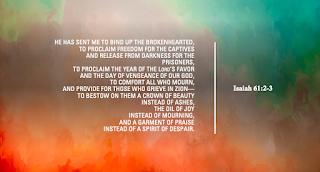Even in prison Joseph honored the Lord's name and brought him glory as the all-powerful, all-knowing God who alone could interpret dreams. His testimony of God's greatness, along with his humble dependence on him, revealed a deep friendship with God which was cultivated in a prison cell of suffering (Psalm 25:14). His suffering, rather than being a sign of the absence of God, was evidence that he was being set apart for a special purpose, which God fulfilled in his life. God never forgets his beloved!
Friday, November 5, 2021
God Never Forgets His Beloved
Even in prison Joseph honored the Lord's name and brought him glory as the all-powerful, all-knowing God who alone could interpret dreams. His testimony of God's greatness, along with his humble dependence on him, revealed a deep friendship with God which was cultivated in a prison cell of suffering (Psalm 25:14). His suffering, rather than being a sign of the absence of God, was evidence that he was being set apart for a special purpose, which God fulfilled in his life. God never forgets his beloved!
Saturday, June 12, 2021
Jesus: The Lifter of our Guilt and Shame
The enemy of our souls is a master of shame. He uses it to crush us under the lie of worthlessness and makes our lives miserable. His favorite weapon with us, just as it was with Adam and Eve, is to first tempt us to sin and then to hurl accusations at us regarding our shame and guilt (Zech 3:1; Rev 12:10). In the Garden, Adam and Eve were so shamed that they hid from God, the very One who lovingly made them and walked with them in intimate communion as their Good Father (Genesis 3:8).
The great news is that if we are in Christ, God beckons us to come to him through Christ's atoning blood to receive his glory covering in place of our shame. The Bible says that "those who trust in him will never be put to shame" and that their "faces are never covered with shame" (Rom 10:11; Ps 34:5). This isn't, of course, because Christians are sinless, but because of the imputed righteousness of Christ credited to our account (Rom 5; 1 Jn 1:8). He promises that nothing can ever separate us from his love and that instead of being covered with shame and guilt he has covered us with his honored robe of Christ's very righteousness (Rom 8; Is 61:10). Theologians call this an alien righteousness since it does not originate with us but with Christ our Lord -- who is our "righteousness, holiness and redemption" (1 Cor 1:30). When we sin as his adopted and chosen children, instead of standing in the shame and guilt and soaking it in, we can go confidently (and quickly) before the throne of grace to "obtain mercy, and find grace to help in time of need" (Heb 4:16). Jesus assures us that he is at the Father's right hand interceding for us (Rom 8:34). And the Father through his living Word promises that we are eternally loved, accepted, chosen, adopted and forgiven (Eph 1). He also guarantees that he will not allow anything or anyone to take us from his sovereign hand if we have been joined to Christ through his gift of repentant faith (Jn 10:28). He has become our eternal glory covering and the lifter of our head (Ps 3:3), so that guilt and shame no longer have power to rule our lives. This truly is Good News worth soaking in.
https://www.youtube.com/watch?v=XZDyMJhd4Bo
Sunday, June 6, 2021
Holy Is Who You Are In Christ
It's all too easy to come to Christ at salvation through faith and then to seek to live the Christian life by coming back under the law, like the Galatians did (Galatians 5). By coming under the law I am referring to trying to obey it in our own strength out of guilt motivation and as a way to be right with God, which Paul says puts us under a curse (3:10). The Gospel provides a completely different and better way of obedience through trusting in Christ's perfect obedience (Romans 5:17-20), which releases us from the condemnation of the law and its demands to do it in our own strength (Romans 8:1-7). As those who are now under grace (Romans 6:14), we do not use this freedom as a "cover up for evil" so that we can sin, but we are "free to walk in the new way of the Spirit" (1 Peter 2:16; Romans 7:6).
This all begins by knowing who we are in Christ -- knowing our new position and identity as those who are no longer slaves to sin but beloved children of God. One author puts it like this, "Holy is who you are" (Hubbard, 2020). Sinclair Ferguson (2014) in his book Devoted to God: Blueprints for Sanctification says that "Our who determines our do." In other words, by first knowing who we are as those who are holy and loved in Christ, we are then able to joyfully walk in the Spirit according to God's Truth, not as a way of trying to earn salvation but as a way of pleasing God and living like his redeemed children.
I've included some links below for reference. The first is the Desiring God article by Hubbard (2020), "Holy is Who You Are," the second is a brief article my husband wrote for the GCU Blog, "On Finding Our New Identity in Christ" (Kreitzer, 2017), the third is a link to an excellent book on the topic titled, Union with Christ (Wilbourne, 2016) and the last is Ferguson's book, Devoted to God:Blueprints for Sanctification (2016).
Nancy Kreitzer
https://www.desiringgod.org/articles/holy-is-who-you-are
https://www.gcu.edu/blog/theology-ministry/dear-theophilus-finding-our-new-identity-christ
https://www.amazon.com/dp/B01E4TGTJS/ref=dp-kindle-redirect?_encoding=UTF8&btkr=1
Ferguson, S. B. (2016). Devoted to God: blueprints for sanctification. Banner of Truth Trust.



